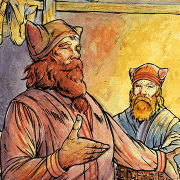|
Speaking of Babylon 5, the Psi Corps, and the sci-fi thing of having persecuted minorities with special powers, I found an interesting set of writings called Behind the Gloves a few days ago. Essentially, it's a reading of the series and the Psi Corps novels that constitutes a legal, social, and historical defence of Al Bester's perspective -- that the Psi Corps was necessary to give telepaths a chance against mundanes and destroying it wasn't so much about wiping out fascism but getting rid of an easy bogeyman. While a lot of it is fanfiction, there's a lot of detailed analysis of anti-telepath sentiment in the series and a cohesive collection of various factoids and bits and pieces from the episodes of the series and the three Psi Corps novels. Something interesting that it pointed it is how the series treats the Psi Corps like the Gestapo when telepaths are more of a persecuted minority, suffering from hate crimes even during the series run. As Bester basically thinks, who is going to protect 'his people' if not the Psi Corps? Another interesting thing it points out is that the Psi Corps did not create the laws that treat telepaths as second-class citizens. That's the fault of the Earth Alliance. It points out that a lot of the people who are anti-Psi Corps in the series run have contradictory accounts and sometimes conflict with each other. While the Psi Corps was never a good organization, and the reading points out that Bester is overly idealistic compared to most people in the Corps, it only really became the beast it did while under the control of multiple 'mundane' Directors, the most influential of which basically eliminated pro-telepath Corps members and replaced them with pro-EA/Clark stooges, leading to a rise in anti-telepath violence. Mundanes using the Corps for their own political ambitions is something that the author argues goes all the way back to the formation of the proto-Corps, the MRA, and is something that only ever leads to immense harm against telepaths. Anyway, one of the things I found interesting was how the show uses telepaths as a punching bag for a lot of characters and typically seems to assume that all telepaths are black hat Corps members. Ivanova commits attempted murder of a telepath on Io under unclear circumstances, and this is treated as a joke by Sheridan and the show. Ivanova attempts to kill Bester and Sheridan reprimands her for it only so much because he doesn't want her to 'throw her career away' and that he's 'not worth it.' This is, to be clear, a member of the military preparing to kill a police officer because she doesn't like him. It wasn't the Psi Corps that made her mother take the sleeper drugs that led to her suicide, after all--it was the Earth Alliance law that said all telepaths must join the Corps or take the sleepers. Like the reading points out, the series has this narrative where it's telepaths abusing telepaths and often ignoring that it's the result of normals creating a situation where a minority must hunt down their own kind or suffer. Which is something Bester points out in the Psi Corps novels, funnily enough. What's was interesting, however, was a bit where Sheridan and Garibaldi have an exchange that touches on this. Garibaldi says that the Psi Corps has only ended up how it has because of how scared normals were of telepaths -- "we took away every right they had and shoved them into a black box called Psi Corps." Sheridan agrees: "If you ask me, we created our own monster. And maybe we deserve it." But this perspective never shows up again--for the most part, the Corps are psychic Nazis who are corrupting society for their own nefarious ends. In that same episode, the writer points out that Garibaldi says it's EA law that prevents telepaths from leaving the Alliance -- not Corps law. The writer points out that using Stanton's Ten Stages of Genocide, the writers of Babylon 5 have clearly created a scenario where telepaths are being slowly genocided by the Earth Alliance but never actually engage with it.
|
|
|
|
|

|
| # ? Apr 20, 2024 03:40 |
|
Psi Corp secretly invented and distributed a drug designed to give normal people telepathic powers as part of a eugenic experiment to create more telepaths regardless of the number of mundanes that needed to die in the process. They absolutely are victims themselves as that reading suggests but they use the unique power and privilege they acquired by acquiescing to that victimization to engage in race warfare. Bester's perspective on the Corps being necessary and a convenient boogeyman is because he's a supremacist.
|
|
|
|
To be honest, I don't find the argument 'the minority is hurting the majority that controls them as second-class citizens' a particularly compelling one. The Psi Corps isn't a benevolent organization and Bester is a supremacist, yes. But, on one hand, there's the failed Dust experiment that doesn't actually kill people, it just gives them telepathy -- and while Bester argues he was against it because it didn't enhance existing telepaths, it's likely he doesn't want to give 'mundanes' psi, too. On the other, you've got powerful mundane organizations developing the sleepers and then, later, the Edgar telepath virus that inflicts pretty horrendous pain and even death if the telepath doesn't keep taking the cure. Let's be honest, it's not remotely equivalent. Imagine a similar context with a real world minority. It's hard not to see the point Bester is making when, at his trial, he says that a big reason people shut down Psi Corps was because the telepaths were able to fight back. Even after the dissolution of the Corps, the mundanes are still killing and hurting and harming telepaths, continuing a pattern that has persisted since they discovered the telepath gene. Is it race warfare, or is it self-defence in the face of an existential threat? You said a few posts ago that the trick to undoing this would be mundanes treating telepaths well -- but what do you do when the majority refuses and has refused to do so for a hundred years? What message is a sf/f narrative sending when it puts the blame on how the minority conducts itself and not on the crimes that are visited upon members of that group by the majority? That's not to say that the Corps should be excused at all, nor Bester. There's a wealth of difference between a P12 Psi Cop and a P1 telepath-in-name-only. There are certainly members of the minority with privilege -- Bester is practically one of the most powerful people in the EA -- but the use of 'acquiescing' doesn't feel accurate. Do you truly acquiesce to something when the alternative is extermination? All someone like Bester has is a chain with a little more slack in it. If he figures he can use that chain to string up the people who will hurt his people, is that wrong? Babylon 5 itself frequently invokes a sort of utilitarian moral calculus, both using real world ideas (the myth of Churchill and the Coventry Raid, for example) and frequently in in-universe dilemmas. Spending thirty telepath lives to save thirty thousand normals is invoked as the right option in the episode Endgame--but notably, that is done without the consent or perhaps even awareness of the telepaths involved. Some must be sacrificed if all are to be saved is practically a series refrain, and pretty much all of the 'moral' characters believe it. But so does Bester, he just sacrifices mundanes to save telepaths. Even if we tallied up every mundane harmed by Psi Corps, I imagine it'd be far less than the number of telepaths harmed by mundanes. When are the scales balanced? Can they ever be balanced? I'd be curious to know which parts of the canon came from JMS and the outline he provided to Keyes, and which stuff came from Keyes. Based on his usenet posts, JMS appears to view telepaths as something of an existential threat to civilian life and equates allowing Psi Corps to operate in court and so on as one step removed from tyranny. While I'm somewhat sympathetic to this viewpoint myself -- the existence of any superpowered minority would be utterly transformative to human society, I think -- I think it explains why the 'Psychic Nazi' element is much stronger than the 'persecuted minority' element and why even the most prominent 'good' telepath -- Lyta Alexander -- ends up effectively ostracizing herself from society at the end of the series. The series doesn't really know how to handle these issues, and the conclusion it decides upon with the PMC organization feels childish and insincere because of it. Milkfred E. Moore fucked around with this message at 03:48 on Jun 9, 2021 |
|
|
|
|
Its a reasonable argument, and a universe where the storyline where they attempted to address this issue (Byron) did not utterly suck would have been preferable to really flesh out this dilemma and the innocence and victimization of the telepaths themselves as opposed to the Corps as an institution. But again, I don't give any creedence to Bester's perspective and arguments on the situation because Bester is a supremacist. An open one any time he thinks he can get away with it. He tells Sheridan to his face that mundanes are the past and the future belongs to telepaths, and Garibaldi that the reason mundanes are expendable is because they "breed like rabbits." He's a victim of oppression who is eagerly plotting the day he can put his own race on top of an equally bad if not worse reverse system. Psi Corp as an institution is absolutely, unequivocally involved in covert race warfare, and that telepaths as a minority group are suffering and that the Earth government is guilty as hell for how it treats them doesn't change that. Killmonger was indeed the villain, not the hero. You bring up Edgar's virus as proof that Psi Corp's methods might be necessary given the degree of threat Telepaths are under, but Edgars was, you know, a villain. He went on record saying that Clark was small potatos next to Telepaths who was only dangerous because Sherridan was 'forcing,' him to give the telepaths more power, and Clark had already murdered who-knows-how-many on the rebel colonies by the time that argument was made. "Some must be sacrificed if all are to be saved," and its utilitarian character as a philosophical theme of the show is (aside from an ideology that is really imposed on the Young Races by the Shadows and Vorlons, but that's a whole other argument) a perspective who's final form when the Young Races are making their own decisions is ultimately in the importance of SELF sacrifice for the protection of the inherent sanctity of life, not the sacrifice of the smaller number for the larger number of lives. As Delenn says her cause is "Life, one life or a billion," and in the end they all prove it with how they deal with the Shadows and Vorlons. I mean, just compare Bester and the Psi Corp to G'kar and the Narns.
|
|
|
|
Milkfred E. Moore posted:Imagine a similar context with a real world minority. It's hard not to see the point Bester is making when, at his trial, he says that a big reason people shut down Psi Corps was because the telepaths were able to fight back. Even after the dissolution of the Corps, the mundanes are still killing and hurting and harming telepaths, continuing a pattern that has persisted since they discovered the telepath gene. Is it race warfare, or is it self-defence in the face of an existential threat? You said a few posts ago that the trick to undoing this would be mundanes treating telepaths well -- but what do you do when the majority refuses and has refused to do so for a hundred years? What message is a sf/f narrative sending when it puts the blame on how the minority conducts itself and not on the crimes that are visited upon members of that group by the majority? Imagine how much trouble they could have saved themselves if Sheridan and Delenn had had Lyta over for dinner, thanked her for her service, and then made any kind of public acknowledgement of telepaths at all. Even if they'd just given a her a stipend so she could pay her rent without going crawling back to the Corps. They gave her back to Bester by sheer neglect. It's a big deal that Delenn went to Zha'ha'dum for Sheridan, but so did Lyta. And she got nothing for it. It's like the existence of human telepaths is a blind spot for Sheridan and he just can't see them. It's one of his biggest flaws, and it influences the events of Season 5 a great deal. Milkfred E. Moore posted:Babylon 5 itself frequently invokes a sort of utilitarian moral calculus, both using real world ideas (the myth of Churchill and the Coventry Raid, for example) and frequently in in-universe dilemmas. Spending thirty telepath lives to save thirty thousand normals is invoked as the right option in the episode Endgame--but notably, that is done without the consent or perhaps even awareness of the telepaths involved. Some must be sacrificed if all are to be saved is practically a series refrain, and pretty much all of the 'moral' characters believe it. But so does Bester, he just sacrifices mundanes to save telepaths. Even if we tallied up every mundane harmed by Psi Corps, I imagine it'd be far less than the number of telepaths harmed by mundanes. When are the scales balanced? Can they ever be balanced? Sanguinia posted:As Delenn says her cause is "Life, one life or a billion," and in the end they all prove it with how they deal with the Shadows and Vorlons. Weighing lives on a scale is not moral, Delenn is right. Weighing lives on a scale is, however, ethical, so Sheridan is "right" when he sacrifices 30 telepaths to shut down the fleet at Mars and save 30,000. It's less ethical if you consider telepath lives and "normal" lives differently as Bester does, and it would be more ethical if Sheridan valued all of Earth's children equally. He plainly doesn't given how he allowed Lyta to end up when he could have saved lives by extending her a hand in friendship of simply offered gratitude for her sacrifices and the risks she took at Zha'ha'dum and to take down Kosh2. It's everything bad about "I don't see race" right there on your TV screen.
|
|
|
|
^^^ Yes, absolutely. The show's treatment of Lyta is really strange, too. For all the talk of how bad it is that telepaths are treated as weapons, Lyta is frequently treated in the exact same way despite being a pivotal, vital component of Sheridan's efforts against Earth and the Shadows. It's something the show is aware of at least, when Lyta gets upset about in Season 4 and then snaps entirely in Season 5, but that makes Sheridan's blindness stranger, and takes on an interesting color when you can read JMS' comments about how he seems to think of telepathy as an existential threat. Even as helpful as she is, is Lyta still damned by her blood? Byron is perhaps the most frustrating aspect of the telepath subplot. When you get right down to it, he is one of the most privileged telepaths in existence -- P12 rating, Psi Cop training, Bester's protégé, good looks, fabulous hair -- and the show does its best to present him as this poor, tragic figure who's seen the light and he's trying to do the right thing by his people. All he wants is a homeworld for telepaths, is that so wrong? He just wants his people to live free! But the moment he feels slighted, he leaps right back into telepath supremacism, practically echoing Bester himself, and attempts to blackmail the political elite of the Interstellar Alliance because they won't just hand him a planet. Then he blows himself and his followers up because telepaths are killing telepaths. Like, which planet, Byron? Which political group should give it up? Should the ISA force someone to give a planet up? Who's going to protect you? Given that your group appears to be entirely human telepaths, should the Earth Alliance be made to give up the planet? The Earth Alliance, as discussed, is the source of anti-telepath legislation and registration. As we see later in Season 5, the Interstellar Alliance can't even prevent the Narn Regime and Drazi Freehold from committing indiscriminate orbital bombardment against the Centauri Republic. Had Byron ever gotten his wish, I'm fairly certain the EA would've just had black ops teams come by and capture them. It's all fine, anyway. The inevitable end result for humanity is to become a species of (presumably telepathic) energy beings. Milkfred E. Moore fucked around with this message at 08:08 on Jun 9, 2021 |
|
|
|
|
Milkfred E. Moore posted:It's all fine, anyway. The inevitable end result for humanity is to become a species of (presumably telepathic) energy beings. Side note, but if I remember correctly its NOT inevitable. The Centauri still aren't there when the Humans and Minbari go to the Vorlon Homeworld to be the NEW Vorlons as I recall.
|
|
|
Sanguinia posted:Side note, but if I remember correctly its NOT inevitable. The Centauri still aren't there when the Humans and Minbari go to the Vorlon Homeworld to be the NEW Vorlons as I recall. Well, that depends how we see inevitability in regards to B5 as a text. The Centauri don't make it, and neither do the Narn. While Kosh sums them up as a dying people at one point, whatever that means, I assume more that it means that the Narn and Centauri could never break out of the eye-for-an-eye cycle of violence, whereas humanity and the Minbari somehow managed it. Which is kind of funny given how the Minbari seem to be the species most resistant to change and most insistent on continuing old feuds for, like, their slighted honor.
|
|
|
|
|
gently caress. i need to see Babylon 5 now.
|
|
|
|
Milkfred E. Moore posted:Which is kind of funny given how the Minbari seem to be the species most resistant to change and most insistent on continuing old feuds for, like, their slighted honor. I don't know about the 'resistant to change' bit. The Minbari came out of their civil war with a more progressive government thanks to Delenn breaking the Council.
|
|
|
|
The Vorlons were pretty resistant to change themselves. Minbars resemble them a lot.
|
|
|
|
mllaneza posted:I don't know about the 'resistant to change' bit. The Minbari came out of their civil war with a more progressive government thanks to Delenn breaking the Council. "Had to fight a war to be less lovely" is kind of a hallmark of being resistant to change.
|
|
|
|

|
| # ? Apr 20, 2024 03:40 |
mllaneza posted:I don't know about the 'resistant to change' bit. The Minbari came out of their civil war with a more progressive government thanks to Delenn breaking the Council. She broke the Council in 2260, which led to a power grab by the Warrior Caste and civil war. She reformed it 2261 and handed five of the nine positions to the Worker Caste, basically installing them as the power brokers in Minbari society as it seems they tend to vote down caste lines. It's an easy reading to see this as a beatific dictatorship of the proletariat kind of thing, and that's basically how Delenn describes it, but we also don't know enough about the Worker Caste -- on Minbari society -- to understand what this means. It seems like one of those happy, simplistic fixes, much like forming the ISA or rebranding the Psi Corps, etc. We never even meet a member of the Worker Caste or see any on screen, even though they're one of the groups that aid Delenn and Sheridan in their fight against the Shadows. It's additionally complicated by the fact that for much of the series run, the Minbari society is actually only made up of two castes -- Warrior and Religious. The first mention JMS makes of them is when Season 3 is airing, I think, but we still never actually see any, and in Season 1 Delenn says that Minbari society is made up of only two castes. edit: The issue with this is that from what we see, Minbari society is fiercely delineated -- according to JMS, it's "absolutely specific." The Religious caste attends to spiritual matters, prayer, diplomacy, and so on. The Warrior caste operate entirely the warships and other weapons of war and do all the fighting. The Workers just seem to build and maintain the Federation, from the warships to the temples. However, when the Council breaks and Workers and Religious members go with Delenn, they take with them a fair few warships seemingly crewed by the Religious caste. This is never really explained. And how long is it, does one think, until the Warrior caste realize they can take power again, no matter how many Workers are on the Council? Dapper_Swindler posted:gently caress. i need to see Babylon 5 now. It's a really good show! People tend to see it as a thoughtful, hard-ish sci-fi series, but I've considered it more of an epic space opera melodrama about great men and the struggle against light and dark for a while. The first season is really rough but it picks up notably in the second and keeps getting better, although the fifth season gets rough again at times due to it being a last-minute pick-up by the network. It's also one of the few shows where the more you learn about the difficulties they had in making it, and all kinds of behind the scenes issues, the more of an art it appears -- so much of B5 was reflecting things that the actors had gone through or were going through, which makes the adage of the show ("Faith manages") very heartfelt. Milkfred E. Moore fucked around with this message at 03:05 on Jun 10, 2021 |
|
|
|














